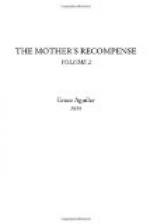“Was it but a dream, or did I not read that Edward lived, was spared,—that he was not drowned? Oh, tell me, my brain seems still to swim. Did they not give me a letter signed by him himself? Oh, was it only fancy?”
“It is truth, my beloved; the Almighty mercifully stretched forth His arm and saved him. Should we not give Him thanks, my child?”
Like dew upon the arid desert, or healing balm to a throbbing wound, so did those few and simple words fall on Ellen’s ear; but the fervent thanksgiving that rose swelling in her heart, wanted not words to render it acceptable to Him, whose unbounded mercy she thus acknowledged and adored.
Mrs. Hamilton pressed her closer to her bosom, again and again she kissed her, and tried to speak the words of affectionate soothing, which seldom failed to restore Ellen to composure.
“You told me once, my Ellen, that you never, never could repay the large debt of gratitude you seemed to think you owed me. Do you remember my saying you could not tell that one day you might make me your debtor, and are not my words truth? Did I not prophesy rightly? What do I not owe you, my own love, for sparing me so much anxiety and wretchedness? Look up and smile, my Ellen, and let us try if we can listen composedly to our dear Edward’s account of his providential escape. If he were near me I would scold him for giving you such inexpressible joy so suddenly.”
Ellen did look up and did smile, a bright beaming smile of chastened happiness, and again and again did she read over that letter, as if it were tidings too blessed to be believed, as if it could not be Edward himself who had written. His letter was hasty, nor did he enter into very many particulars, which, to render a particular part of our tale intelligible, we must relate at large in another chapter. This epistle was dated from Rio Janeiro, and written evidently under the idea that his sister had received a former




